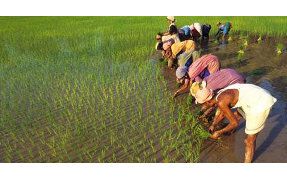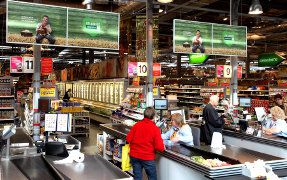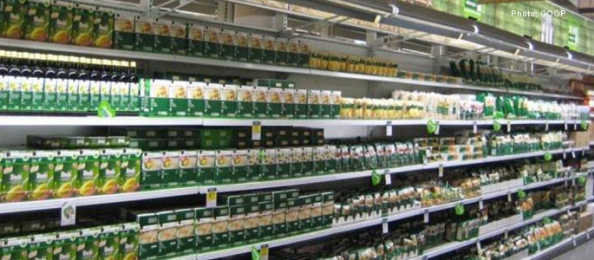Coop Naturaplan – 20 Years of Commitment to Organic Agriculture
The cultivation of agricultural crops and the production of food are resource-intensive activities that negatively impact the environment and society. About one-third of the Swiss population’s ecological footprint is due to food consumption. Coop is the second-largest retailer in Switzerland. The cooperative has lived up to its responsibility by promoting organic and fair agriculture for more than 20 years.
Coop Naturaplan – Success story of an organic brand
In the beginning, a couple of people at Coop had a vision of providing affordable organic products for “everyone.” What started with fresh products such as yoghurt, bread, meat, and eggs 20 years ago has now grown into a range of more than 1,700 products, including innovative organic convenience products such as pizza and sushi. In Switzerland today, every second organic product is sold at a Coop point of sale. Coop’s turnover with organic food amounts to CHF 1,001 million ($ 1.11 billion) and accounts for 10 percent of Coop’s total food offering.
This success story started in 1993 with the launch of Coop’s own organic brand, “Coop Naturaplan” – it was the first time a retailer in Switzerland had done so. At the outset, Coop established, and has maintained, a strong partnership with Bio Suisse in order to promote a breakthrough in high-standard organic farming in Switzerland (see box), and hence to change industrial agricultural practices. In doing so, Coop has played a pioneering role in fostering organic farming in Switzerland and abroad.
However, Coop also faced major challenges along the way:
- In the beginning, organic products had a “tree hugger” image, which required both communication efforts and considerable management commitment to emerge from this niche. Nowadays, Coop Naturaplan has a recognition rate of more.
- than 90 percent and is the best-known household organic brand in Switzerland. The song composed for its 20th anniversary campaign even made it to number one on the Swiss single charts.
- The quality and availability of organic products have often been unsatisfactory, and Coop had to develop its own production and sourcing projects.

Organic research and innovation
Given the scarcity of organic products in the 1990s, Coop decided to promote research in organic agriculture together with another well-established partner. For the past 17 years, Coop has engaged in an intensive cooperation with Switzerland'sResearch Institute of Organic Agriculture(FiBL) in order to support basicresearch in organic farming practices (e.g.,reduction of concentrated feed in milkproduction and the potential of organicfarming in the tropics) and to implementconcrete sourcing projects. The resultsof the basic research are available to thepublic and designed to promote organicfarming worldwide. Since 2003, the CoopSustainability Fund has financed the researchand development of sustainabilityprojects with a current annual budget ofCHF 15 million ($ 16.8 million). It supportsinnovative ecological solutions andpioneering practices to make organicfarming more sustainable, enables theformation of ecological and fair supplychains, and sensitizes the population tosustainable consumption. Whereas thefocus was initially placed on basic challengessuch as the cultivation of organicapples that are of satisfactory quality, theprojects today are often more complex.
Example 1: In a procurement project for sustainable cocoa from Honduras, Coop, its production site Chocolats Halba, and partner NGO Helvetas helped restore cocoa plantations that were hit by a typhoon. This organic agroforestry project is aimed at protecting the rainforest and improving the living conditions of the local cocoa farmers. It includes training, the development of infrastructure, the diversification of crops (cocoa and wood), water management, as well as building up long-term and fair partnerships. With this engagement, Coop was able to introduce a high-quality Honduras Chocolate certified by Bio Suisse and Fairtrade Max Havelaar (FLO) into the Naturaplan range. Furthermore, thanks to the agroforestry approach, the entire production process is carbon neutral.
Example 2: With its “Fair & Good Project,” the Coop rice mill Reismühle Brunnen, together with several partners, promotes organic fair-trade rice cultivation in India and Thailand. The project builds on cooperative research and development, together with local farmers and universities, to develop adapted cultivation methods that go beyond organic standards in terms of water management and greenhouse gas emissions. In addition, it focuses on raising the living standards of small-scale farmers, increasing their independence from creditors and seed producers, and promoting self-determination. As of the end of 2013, there were 1,500 farmers who already belonged to the producer cooperatives involved, which deliver 850 metric tons of rice, certified to the Bio Suisse and Fairtrade Max Havelaar (FLO) level of standard.

Outlook
By the 20th anniversary campaign of “Naturaplan,” Coop had reaffirmed its commitment to promoting organic farming. As the first retailer worldwide, it managed to launch dual-branded products, together with renowned brand manufacturers such as Nestlé and Unilever, and hence prompted them to develop their first organic products according to the Bio Suisse standard. The worldwide promotion of organic farming by Coop has had positive effects on producers, consumers, the environment, and thus on society in general. Many agricultural and manufacturing companies in Switzerland and abroad have been able to build an economically viable – and environmentally and socially sustainable – business model. This commitment is now firmly anchored in Coop’s core business, is financially successful, and will be continued in the next 20 years.
| Initiator | COOP |
| Project start | 1990 |
| Status | ongoing |
| Region | worldwide |
| Contact person | Conradin Bolliger |
| Awards | - |
| Anti-Corruption | - |
| Business & Peace | - |
| Development | - |
| Environment | X |
| Financial Markets | - |
| Implementing UNGC Principles in your Corporate CSR Management | - |
| Human Rights | - |
| Labour Standards | - |
| Local Networks | - |
| Advocacy of global issues | X |
| Business opportunities in low income communities/countries | - |
| Project funding | - |
| Provision of goods | - |
| Provision of services/personal | - |
| Standards and guidelines development | X |
About Coop
Coop, a Swiss cooperative, is the second largest retailer after the Migros in Switzerland. In 2001, Coop merged with 11 cooperative federations which had been its main suppliers for over 100 years. As of 2007, Coop operates 1437 shops and employs almost 48 200 people. According to Bio Suisse, the Swiss organic producers' association, Coop accounts for half of all the organic food sold in Switzerland. Coop's four primary organic brands are Coop Oecoplan, Coop Naturaline, Coop Naturaplan, and Max Havelaar.
Coop also has a low-cost product line, "Prix Garantie." Other than that, the latest product line from Coop is entitled PlanB and focuses on young clients looking for food on the go.
The chain has an online presence called coop@home. The web site offers much of the same selection found in the Coop stores and delivers groceries, wine, flowers, books, and other products to customers in Switzerland and Lichtenstein. It currently markets its services in German, French, and English.
Coop and Sustainability
Sustainability is an integral part of the Coop Group's business
activities and a cornerstone of its long-term success. Coop has
therefore incorporated sustainability into its Articles of Association,
Corporate Profile and Mission Statement. It translates this
responsibility into practice in its everyday operations and focuses on
strong, long-term partnerships and joint solutions.
Its annual Sustainability Report provides transparent information on Coop's ecological and social-accountability activities, its goals and the measures it takes to achieve them.
Coop coordinates all its sustainability-related activities through the Sustainability Steering Committee, on which all the business units and departments concerned are represented. This body directs projects dealing with sustainable sourcing and corporate ecology and checks the extent to which they achieve their goals. It also sets priorities for implementation and communication.
Wherever possible, Coop seeks
to integrate sustainability into its standard procedures and processes.
It also incorporates the sustainability goals into its individual
strategies. Hence, line management is responsible for implementing
sustainability-related measures. It is supported by a small team of
specialists responsible for clarifying issues, providing advice,
organizing in-house training and coordinating projects.
Two
interdepartmental committees for food and non-food respectively define
general questions concerning standards, priorities and any corrective
measures to be taken. The actual work of coordinating sustainable
sourcing is done in small, project-related working groups.
At the
corporate-ecology level, Coop has set up two centres of excellence: one
focuses on manufacturing companies, distribution centres and logistics,
the other on the total of over 1,600 points of sale.
Products
Coop operates a wide range of store formats in the food, non-food and service sector.
Source: coop/wikipedia
Write a comment about this page
Your comments are provided by your own free will and you take sole responsibility for any direct or indirect liability. In order to maintain the highest discussion quality, all comments will be reviewed by our editors. You hereby provide us with an irrevocable, unlimited, and global license for no consideration to use, reuse, delete or publish comments in accordance with our Community Guidelines.
About Us // Privacy Policy // Copyright Information // Legal Disclaimer // Contact
Copyright © 2012-2018 macondo publishing GmbH. All rights reserved.
The CSR Academy is an independent learning platform of the macondo publishing group.









